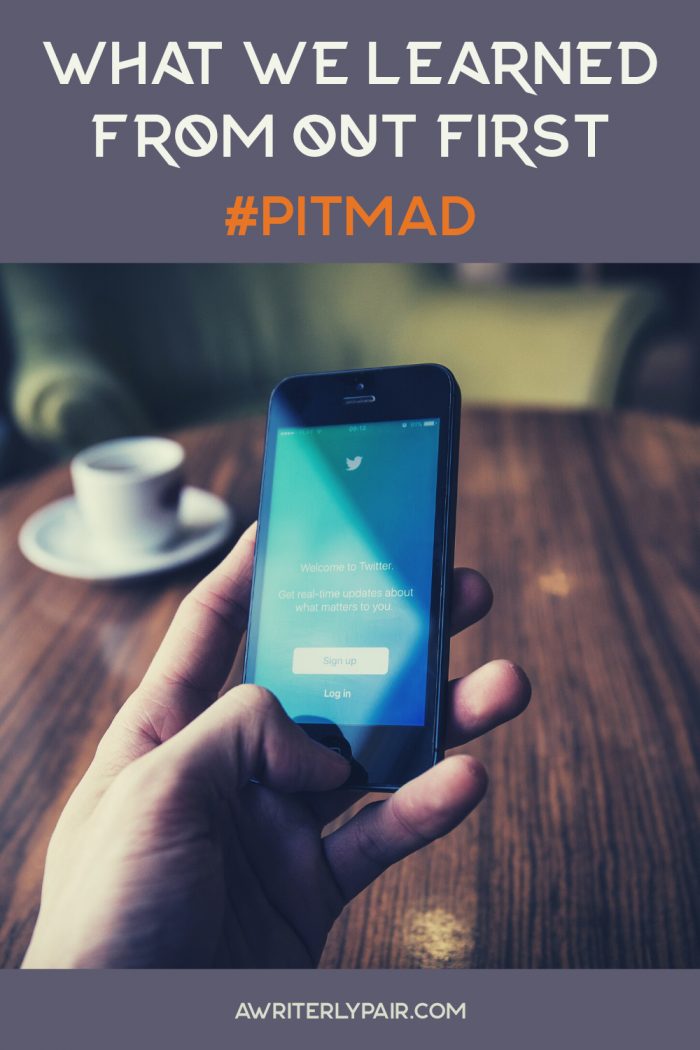It was a quiet Thursday afternoon of preparing queries. I scrolled to the bottom of the query manager form and groaned. The agent I was preparing materials for required a pitch.
We had made a few feeble attempts to make a pitch over the course of writing our manuscript, but neither one of us felt like it was our strong suit. Sure, we could recognize a good pitch from a bad one, but actually making one ourselves?
Instead of skipping the agent and moving on to the next one on our list, I decided to crack my knuckles and get to it. I listened to a few BookTubers’ videos, went on IMDB and Netflix and wrote down some of the pitches I liked, then I went to #PitMad’s official website.
Oh, I thought, they’re having their quarterly #PitMad contest on June 4th. Maybe we should give it go.
Oh, today is June 4th. 😐
I got onto Twitter (after recovering our password, ’cause yeah, it had been that long since I bothered to login 😂) and was immediately overwhelmed. It was like signing up for a convention at the last minute and walking into the crowded convention center. Where did I go? Who did I talk to? What is going on?
In spite of my better judgement, I decided to dip my toe in the water. Before I knew it, I was treading very deep waters while simultaneously trying to make my kids their dinner.
By the end of the day, we had a decent pitch ready for any agent who asked for one. I’d say it was a good experience, all things considered. We learned a bit, so I thought I’d share with you some tips to keep you from scrambling when your time comes.
Before I begin, if you have no idea what I’m talking about or want to learn more, click here to visit PitMad’s official website.
Let’s start with how the basics of a good pitch.
Pitch Checklist: what we need to know:
- Who your MC is. Give us their name + a distinctive characteristic
- Essence of plot. Briefly tell us the premise of your story. Emphasis on “briefly.”
- Stakes. What does your MC want? Tell us the most devastating thing that will occur if they fail.
- Genre. This is required. See #2 below for appropriate hashtags.
- Don’t show up late to the party
Like I said earlier, we halfheartedly jumped in hours after everyone had already posted their first pitch. In fact, some were already tweeting their second pitch. Regardless of how late you are, there is still a chance you will get seen, but timing is crucial when it comes to social media. Get started before everyone is burnt out from scrolling and retweeting.
More importantly, get started days before. Pump up your followers by letting them know you’ll be pitching to agents and to help you out by retweeting. Also, apologize to them for inundating their feed with a slew of pitches. If you’re not already involved in Twitter’s writing community, I highly suggest you make some friends, because you’re gonna need them. I’ll get into that a bit later.
Spend a few days exploring the successful tweets from previous PitMads and take your time making your own. Run them by a few trusted friends and ask for critiques. The more effort you put into your pitches, the more your professionalism will shine through. Any good agent is looking for a business partner. Show them you are worth taking seriously.
There are two more contests for 2020: September 3, 2020 (8AM – 8PM EST) and December 3, 2020 (8AM – 8PM EST) - Categories & genre hashtags
On Twitter, you have a fraction of a second to grab your audience’s attention. Twitter moves so fast! When including your category and genre hashtags (and no, don’t skip this!), don’t use precious character space by typing out #YAFantasy. Instead, check out PitMad’s industry codes to help agents find you in their searches. - Retweet Karma
Remember those friends I told you to find in the writing community? Here’s where you will benefit from a decent following. Begin the day by tweeting something like this:
As people ask for a retweet, let them know you’ve done it and would love one in kind. Be sure to pin your tweets to the top of your profile so people can find it easily.
I have found the writing community to be very encouraging and supportive. We all look out for each other and look for opportunities to help one another reach our goals, whether they be indie or traditional writers. I’m sure there is nastiness and drama in the community, but it’s uncommon enough for me to not encounter it very often— if at all.
And remember,
If at the end of the contest you find yourself without an agent liking your tweet, or an agent decides they liked your pitch but not your manuscript, try not to get discouraged. Your manuscript’s worth is not proportionate to your success in a pitch contest. Each rejection is yet another step up the mountain towards realizing your goal.
Have you participated in #PitMad or anything similar? What did you learn? Did you have a favorite pitch from the most recent contest? Let us know in the comments!
Sjáumst síðar!
-Shy





